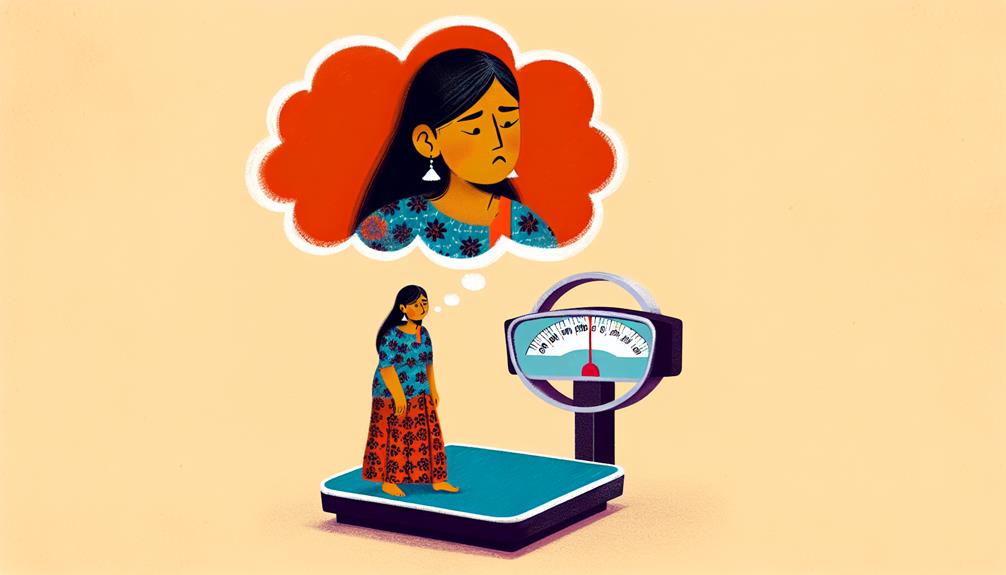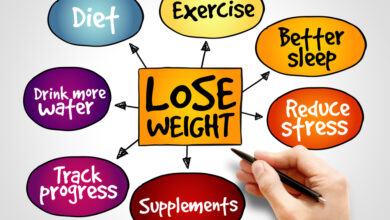
Thought Distortions That Sabotage Weight Loss: A Mental Block to Your Goals
Thought distortions that sabotage weight loss are sneaky little gremlins that live in our minds, whispering negative thoughts and sabotaging our best intentions. They can make us feel like we’re constantly failing, even when we’re putting in the effort. These distorted thought patterns can lead to emotional eating, self-sabotage, and a whole lot of frustration.
But the good news is, we can learn to identify and challenge these negative thoughts, paving the way for a healthier and more positive relationship with our bodies and food.
Imagine trying to build a house on a foundation of sand. It’s bound to crumble, right? Our weight loss journey is similar. If our mindset is riddled with negative thoughts, it’s going to be tough to achieve sustainable success.
So, let’s delve into the world of thought distortions and discover how to build a strong mental foundation for weight loss.
Understanding Thought Distortions

Imagine trying to build a house on a foundation of sand. It wouldn’t last, would it? Similarly, our thoughts are the foundation of our actions and ultimately, our results. If our thoughts are distorted, they can sabotage our efforts, especially when it comes to weight loss.
Thought distortions are common patterns of thinking that can lead to negative emotions, self-defeating behaviors, and ultimately, hinder our progress. These distorted thought patterns can make it incredibly difficult to stick to healthy habits and achieve our weight loss goals.
One of the biggest thought distortions that sabotages weight loss is the belief that breakfast needs to be a special, time-consuming meal. But what if I told you that you could turn last night’s leftovers into a delicious and satisfying breakfast in just a few minutes?
Check out these 5 ways to turn last night’s leftovers into a morning’s breakfast ! By shifting your perspective and embracing creative solutions, you can easily break free from the restrictive thought patterns that hold you back from your weight loss goals.
Common Thought Distortions and Their Impact
Thought distortions can manifest in various ways, influencing our perceptions and actions. Let’s delve into some common thought distortions that can sabotage weight loss:
- All-or-Nothing Thinking:This distortion is characterized by viewing things in black and white. For example, “If I eat one cookie, I might as well eat the whole box.” This rigid thinking can lead to feelings of guilt and failure, making it difficult to stay on track.
- Emotional Eating:When we use food to cope with emotions like stress, sadness, or boredom, we’re engaging in emotional eating. This can lead to overeating and weight gain, as we’re not addressing the underlying emotional needs.
- Perfectionism:Perfectionism can lead to a cycle of self-criticism and frustration. If we set unrealistic expectations for ourselves, any slip-up can feel like a complete failure, making it harder to stay motivated.
- Negative Self-Talk:Our inner voice plays a significant role in our self-esteem and motivation. Negative self-talk, such as “I’m too fat,” or “I’ll never be able to lose weight,” can create a self-fulfilling prophecy, making it harder to believe in our ability to succeed.
The impact of these thought distortions on weight loss can be significant. They can lead to:
- Increased Stress and Anxiety:Constantly criticizing ourselves or feeling guilty about our choices can lead to increased stress and anxiety, which can further contribute to unhealthy eating habits.
- Reduced Motivation:Negative thoughts and feelings of inadequacy can erode our motivation and make it harder to stick to our weight loss goals.
- Increased Risk of Binge Eating:When we feel deprived or discouraged, we’re more likely to engage in binge eating, further sabotaging our progress.
- Lower Self-Esteem:Negative self-talk can lead to a decline in self-esteem, making it harder to believe in ourselves and our ability to achieve our goals.
Common Thought Distortions
Thought distortions are common patterns of negative thinking that can sabotage our efforts in many areas of life, including weight loss. These distorted thought patterns can lead to feelings of guilt, shame, and hopelessness, making it difficult to maintain a healthy lifestyle.
It’s easy to fall into the trap of thinking that a single slice of cake will derail your weight loss journey, but that’s just one of the many thought distortions that can sabotage our efforts. Instead of focusing on restrictive rules, why not embrace delicious and healthy options like slow cooker vegan mashed sweet potatoes ?
This simple recipe is packed with fiber and nutrients, leaving you feeling satisfied and supported in your weight loss goals.
Understanding and challenging these distortions is crucial for achieving lasting weight loss success.
All-or-Nothing Thinking
All-or-nothing thinking, also known as black-and-white thinking, is a rigid and inflexible way of thinking that classifies everything as either perfect or a complete failure. In weight loss, this distortion can manifest in several ways. For example, if someone eats a piece of cake, they may feel like they’ve completely “blown it” and give up on their entire diet.
This type of thinking can make it difficult to stay motivated and make progress.
“I ate a slice of pizza, so I might as well eat the whole thing. I’ve already ruined my diet for the day.”
Overgeneralization
Overgeneralization involves drawing broad conclusions based on a single event or limited evidence. For example, if someone doesn’t lose weight as quickly as they expected, they may conclude that they are destined to be overweight forever. This type of thinking can lead to feelings of hopelessness and make it difficult to continue with weight loss efforts.
“I didn’t lose any weight this week, so I’ll never be able to reach my goal.”
Catastrophizing
Catastrophizing involves exaggerating the potential negative consequences of an event. In weight loss, this distortion can lead to anxiety and fear. For example, someone might imagine that eating a few extra calories will inevitably lead to them gaining a significant amount of weight and becoming obese.
“If I eat this donut, I’m going to gain 10 pounds and never be able to fit into my clothes again.”
Labeling
Labeling involves assigning negative labels to oneself or others. For example, someone might call themselves “lazy” or “weak” for not being able to stick to their diet. This type of thinking can lead to low self-esteem and make it difficult to make positive changes.
“I’m just a fat person. I’ll never be able to lose weight.”
Personalization
Personalization involves taking responsibility for events that are outside of one’s control. For example, someone might blame themselves for their weight gain, even if it was due to factors like a medical condition or a stressful life event. This type of thinking can contribute to guilt and shame, making it difficult to make positive changes.
“I’m overweight because I’m not disciplined enough. I should be able to control my eating habits.”
Challenging Thought Distortions

Identifying and challenging negative thought patterns is a crucial step in overcoming their influence on your weight loss journey. By recognizing these distortions, you can start to replace them with more realistic and positive thinking, ultimately leading to healthier choices and a more positive self-image.
Identifying Thought Distortions
Understanding how to identify thought distortions is the first step in challenging them. Here’s a step-by-step guide:
- Pay attention to your thoughts:Become aware of the thoughts that pop into your head, especially those that make you feel negative or discouraged. Ask yourself, “What am I thinking right now?”
- Identify the distortion:Once you’ve recognized a negative thought, ask yourself, “What type of thought distortion is this?” Refer to the list of common distortions we discussed earlier.
- Challenge the evidence:Ask yourself, “Is there any evidence to support this thought?” Often, you’ll find that the thought is based on assumptions or generalizations rather than facts.
- Consider alternative explanations:Try to come up with other, more realistic explanations for the situation. This can help you see the situation in a more balanced light.
Strategies for Replacing Negative Thoughts, Thought distortions that sabotage weight loss
Once you’ve identified a negative thought distortion, you can begin to replace it with a more realistic and positive one. Here are some strategies:
- Challenge the thought:Instead of accepting the negative thought as truth, challenge it directly. Ask yourself, “Is this really true?” or “What evidence do I have to support this?”
- Reframe the thought:Try to see the situation from a different perspective. For example, instead of focusing on what you’ve “failed” to do, focus on what you’ve “accomplished.”
- Use positive self-talk:Replace negative thoughts with positive affirmations. For example, instead of saying, “I’m going to fail,” try saying, “I’m capable of achieving my goals.”
- Focus on the present moment:Negative thoughts often dwell on the past or worry about the future. Focus your attention on the present moment and appreciate the good things in your life.
Affirmations and Self-Compassion Statements
Affirmations and self-compassion statements can be powerful tools for combating negative thoughts. They can help you build self-confidence, increase resilience, and create a more positive self-image. Here are some examples:
“I am strong and capable. I am worthy of love and happiness.”
“I am learning and growing every day. It’s okay to make mistakes.”
“I am grateful for my body and all it does for me.”
“I am enough, just as I am.”
One of the biggest thought distortions that can sabotage weight loss is the belief that healthy eating means deprivation. But it doesn’t have to be that way! There are tons of delicious and satisfying options, like diets and recipes for meal worthy salads , that can help you reach your goals without feeling like you’re missing out.
Remember, it’s about finding sustainable habits that fit your lifestyle, not about restricting yourself in ways that make you miserable.
Developing a Healthy Mindset

Losing weight is not just about changing your diet and exercise routine; it’s also about changing your mindset. A healthy mindset is crucial for sustainable weight loss and overall well-being.
Self-Acceptance and Body Positivity
Self-acceptance and body positivity are essential components of a healthy mindset. Embracing your body as it is, regardless of its size or shape, allows you to focus on your overall health and well-being rather than solely on weight loss.
“The most important relationship you have is the one you have with yourself.”
Diane von Furstenberg
Instead of striving for an unrealistic ideal, concentrate on appreciating your body’s capabilities and strengths. Recognize that your worth is not defined by your weight. This shift in perspective can empower you to make positive changes for your health without feeling pressured or inadequate.
Mindful Eating and Intuitive Eating
Mindful eating and intuitive eating are powerful tools for overcoming emotional eating and developing a healthy relationship with food. Mindful eating involves paying full attention to your eating experience, savoring each bite, and noticing your body’s hunger and fullness cues.
This practice helps you become more aware of your eating habits and identify triggers for emotional eating.Intuitive eating encourages you to listen to your body’s signals and eat when you are hungry and stop when you are full. It promotes a more flexible and enjoyable approach to food, allowing you to make choices that nourish your body and mind.
Setting Realistic Goals and Celebrating Small Victories
Setting realistic goals and celebrating small victories is essential for maintaining motivation and preventing discouragement.
Setting Realistic Goals
- Focus on making small, sustainable changes rather than drastic overhauls.
- Set achievable goals that fit into your lifestyle and preferences.
- Break down larger goals into smaller, manageable steps.
Celebrating Small Victories
- Acknowledge and celebrate your progress, no matter how small.
- Reward yourself for reaching milestones with non-food rewards.
- Use positive self-talk to reinforce your achievements.
Seeking Support: Thought Distortions That Sabotage Weight Loss
You’re not alone in this journey. Weight loss is a challenging process, and seeking support can significantly improve your chances of success. It’s essential to recognize that addressing thought distortions and developing healthy coping mechanisms often requires professional guidance and a supportive network.
The Benefits of Professional Help
Professional help can provide valuable insights and tools to overcome thought distortions and develop healthy coping mechanisms. Therapists and nutritionists can offer personalized support and strategies tailored to your unique needs.
- Identifying and Challenging Thought Distortions:Therapists can help you identify the negative thoughts that sabotage your weight loss efforts and develop strategies to challenge and replace them with more realistic and positive ones.
- Developing Healthy Coping Mechanisms:Therapists can guide you in developing healthy coping mechanisms for stress, emotional eating, and other challenges that can hinder weight loss.
- Setting Realistic Goals:Nutritionists can help you set realistic and achievable weight loss goals based on your individual needs and preferences.
- Creating a Personalized Meal Plan:Nutritionists can create a personalized meal plan that meets your dietary needs and preferences, promoting healthy eating habits.
- Providing Ongoing Support and Accountability:Therapists and nutritionists can provide ongoing support and accountability, helping you stay motivated and on track.
Finding Support Resources
Here are some strategies for finding support from therapists, nutritionists, or support groups:
- Ask for Referrals:Ask your doctor, friends, or family members for recommendations for therapists or nutritionists in your area.
- Search Online:Many online platforms, such as Psychology Today or Healthgrades, allow you to search for therapists and nutritionists based on your location and specialization.
- Contact Your Insurance Provider:Your insurance provider may have a list of therapists and nutritionists in your network.
- Join a Support Group:Support groups provide a safe and supportive environment to connect with others who are also working on weight loss. Look for online groups or local in-person groups that focus on weight loss, healthy eating, or emotional eating.
Creating a Positive and Supportive Environment
Surrounding yourself with a supportive environment can significantly enhance your weight loss journey.
- Seek Out Positive Influences:Spend time with people who encourage and support your weight loss goals. Avoid those who may be critical or dismissive of your efforts.
- Join a Fitness Class or Group:Exercising with others can provide motivation, accountability, and a sense of community.
- Share Your Goals with Loved Ones:Let your family and friends know about your weight loss goals and ask for their support. Explain how they can help you stay on track.
- Celebrate Your Successes:Acknowledge and celebrate your progress, no matter how small. This will help you stay motivated and focused on your goals.
Final Thoughts
By understanding the common thought distortions that sabotage weight loss and developing strategies to challenge them, we can break free from the cycle of negativity and create a more supportive and empowering inner voice. Remember, weight loss is a journey, not a destination.
Be patient with yourself, celebrate small victories, and focus on building a healthy and sustainable relationship with your body and food.






